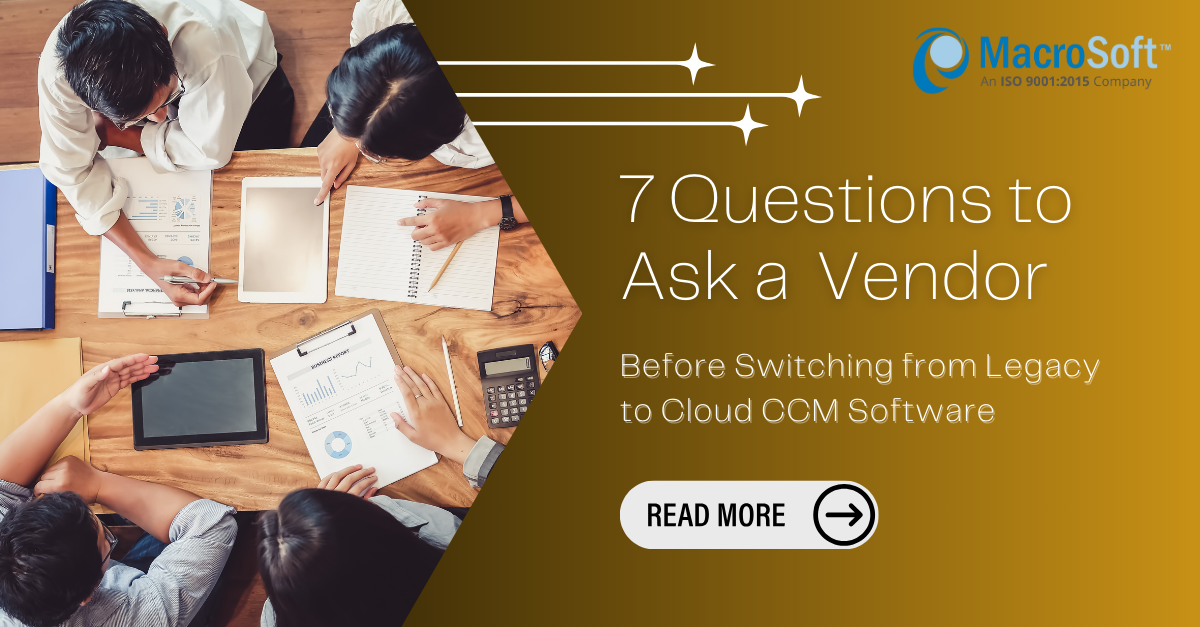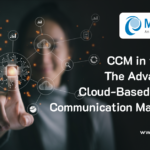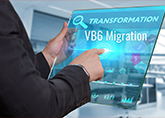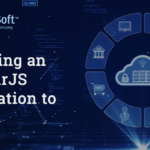

Recently, many organizations have made the transition from traditional legacy systems to more agile and efficient cloud-based solutions. One such transformation is seen in the realm of Customer Communication Management (CCM) software. Cloud CCM software offers numerous advantages, including cost-efficiency, scalability, and improved customer experience. However, before you make the switch, it’s essential to ask the right questions when evaluating potential vendors. Selecting the right vendor is paramount to the success of your transition from legacy to cloud-based solutions. We have explored seven crucial questions that you should ask a new vendor before making this significant shift. Let’s shed some light on how Macrosoft Inc’s CCM services cater to these vital considerations.
1. How does your Cloud CCM vendor evaluate my Legacy System?
Before embarking on the journey of transitioning to a cloud-based CCM solution, it’s crucial to understand how your potential vendor assesses your existing legacy system. A reliable vendor should provide a comprehensive evaluation of your current infrastructure, identifying strengths and weaknesses, and creating a tailored migration plan. This initial assessment is the foundation of a successful transition.
2. What is your experience in Legacy to Cloud CCM transition?
Experience matters, especially when it comes to complex transitions like moving from legacy to cloud CCM software. Ask your potential vendor about their previous experience in similar projects. Inquire about case studies or success stories that showcase their expertise in handling such transitions. This will help you understand the vendor’s track record and the success stories of other organizations that have adopted their cloud CCM software. A reputable vendor should be able to provide you with references from clients in similar industries or with similar needs.
Case studies can give you insights into how the vendor’s software has addressed specific challenges and delivered results for other businesses. Don’t hesitate to contact these references to gain firsthand knowledge about their experiences with the vendor’s solution.
3. How do you select a CCM Software vendor?
Selecting the right cloud CCM software vendor is a critical decision. Ask your potential vendor about their criteria for evaluating and selecting CCM software providers. Are they vendor-agnostic, or do they have specific partnerships? A vendor-agnostic approach ensures that they will recommend the solution that best fits your needs rather than promoting a particular software package.
4. How is the transition from Legacy to Cloud CCM Software managed?
Switching from a legacy CCM system to a cloud-based one can be a complex process. It’s important to inquire about the vendor’s approach to managing this transition. Find out about their implementation process, the timeline for migration, and the resources they will allocate to ensure a smooth transition.
Understanding the migration process is crucial to a successful transition. Ask the vendor to provide a step-by-step outline of the migration process. This should include data migration, software implementation, training, and post-migration support. Ensure that the process aligns with your business goals and timelines.
Ask for a detailed project plan and inquire about their support and training offerings. A successful transition is not just about the software; it’s also about having the right support in place. Ensure that the vendor provides comprehensive training for your team and a dedicated support system to address any issues that may arise during the migration.
5. What is your Pricing Structure?
Understanding the pricing structure is essential for budget planning and assessing the long-term cost of adopting a new cloud CCM solution. Different vendors may have varying pricing models, such as per-user licensing, usage-based pricing, or flat-rate fees. Ask the vendor to provide a clear breakdown of their pricing, including any additional costs for features or services.
Additionally, inquire about any potential hidden costs, such as data storage fees, implementation fees, or ongoing support charges. It’s important to have a full understanding of the pricing structure to make an informed decision and avoid any financial surprises down the road.
6. What are the ongoing Support and Maintenance Options?
The transition to cloud CCM software is not a one-time event; it’s an ongoing process. Inquire about the support and maintenance options offered by the vendor. This includes their responsiveness to issues, software updates, and their commitment to keeping your CCM system running smoothly.
It is important to know the vendor’s customer support and training services. Understand their responsiveness to issues, availability of online resources, and options for training your team on using the software effectively. These questions will help you assess the suitability of a cloud- based CCM software vendor and ensure a successful transition from legacy systems. Additionally, tailor your inquiries to your specific business requirements for a more comprehensive evaluation.
7. Can it deliver along the entire Customer Journey?
A customer journey map visually represents the “story” of a customer’s experience as they progress through their journey along many channels. Each touchpoint can increase the customer’s awareness of and affinity for the brand. The map also exposes the importance of omnichannel communications for enhanced CX. A CCM solution should analyze customer journey maps and deliver personalized, on-demand communications, no matter where a customer is along their journey. It should also enable smoother, automated omnichannel communications while ensuring consistency of brand voice across this portfolio of touchpoints.
The decision to switch from legacy to cloud CCM software is a significant step toward enhancing your organization’s efficiency and customer communication. However, it’s essential to thoroughly evaluate potential vendors and ask the right questions to ensure a smooth transition. By considering factors like vendor assessment, experience, migration process, benefits, and ongoing support, you can make an informed decision that aligns with your business goals. With the right vendor and a well-planned transition, you’ll be well on your way to reaping the benefits of cloud CCM software.
Macrosoft Inc’s CCM services are designed to meet and exceed the expectations outlined in this blog. Our commitment to your success, vendor-agnostic approach, and wealth of experience makes us a trusted partner in your transition journey. We understand the importance of this decision, and we are dedicated to delivering a seamless and rewarding shift from legacy to cloud-based CCM software. With Macrosoft Inc, your organization can embrace the future of Customer Communication Management with confidence.
By Pavithra Joy | November 7th, 2023 | Quadient Inspire
Recent Blogs


The Peril of Fake Job Candidates in the Technology and IT Industry
Read Blog

Humanizing Automation: Fostering Collaboration in the Digital Era
Read Blog

Advantages of Technology and IT Companies Partnering with Staffing Firms Offering Visa Sponsorship
Read Blog


 Home
Home Services
Services




































